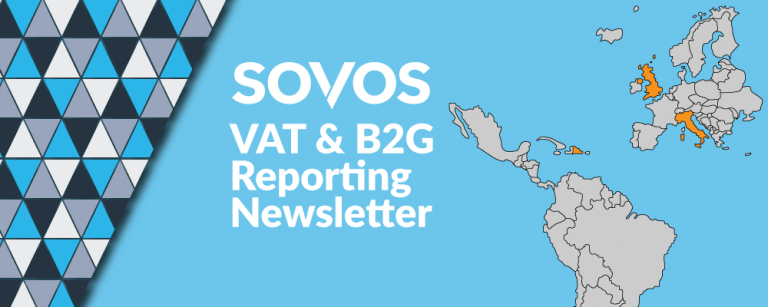Blog

Global companies are increasingly using different tactics to address today’s onerous tax compliance burdens. Some rely on outsourcing to third parties, some have in-house teams to manage VAT compliance and reporting, and others look to shared services to centralise tax filing and reporting tasks. In each approach, technology is essential to keep pace with today’s […]

Since the first launch of eInvoicing mandates in Brazil 10 years ago, eInvoice adoption has now spread worldwide. Governments are implementing complex, real-time, transaction-level requirements to gain visibility into tax liabilities, close the tax gap and minimize corporate tax evasion. eInvoicing compliance is not a simple process for businesses – it requires a total shift […]

I was curious if the buzz over blockchain, AI and machine learning at ISM 2018 would offer up some valuable use cases and “best practices” for attendees to take home and implement, or if the social and other online chatter would still be more focused on “future trends” and “predictions.” It appears the latter won […]

The wave of retiring baby boomers is causing IRA reporting, carried out mainly through form 1099-R, to be a tricky process for some organizations. The numbers are staggering, with 10,000 boomers retiring every day for the next 12 years. That’s a lot of forms 1099-R and 5498. The building volume of forms to mail to […]
Americas’ SAP Users’ Group (ASUG) recently conducted a research study on behalf of Sovos to determine how procurement, tax, finance and IT professionals are currently managing the procure-to-pay tax compliance process, key challenges faced, and the technologies and processes employed to reduce audit exposure and filing risk. Join us on Tuesday, May 22 at 2:00 […]

The other day we provided a recap of our Wayfair webinar, “South Dakota vs. Wayfair and What it Means for eCommerce,” with regulatory analysis expert Chuck Maniace. The following are questions from our attendees, some of which we had to take offline due to time constraints. Please find those additional questions, answered below, and be […]

The floodgates may be opening. Following the EU’s approval of mandatory e-invoicing in Italy, it appears that Greece will be the next European Union member state to follow in its footsteps. As announced after the meeting of the intergovernmental group on 23 April 2018, the introduction of a nationwide mandatory e-invoicing framework will come into […]

The evolution of cryptocurrencies isn’t necessarily going as planned. The virtual “coins,” which aren’t really coins at all, were supposed to disrupt the very concept of money itself. With no central bank, no governmental oversight and no physical manifestation, cryptocurrencies provided a perfect method for some investors to skirt regulation and dodge tax authorities. And […]

Ask any business student what the secret to commercial success is and they’ll tell you it’s profit margin, not just sales volume. Therefore, to be good at selling things you have to excel at buying them. Usually, companies have a strong incentive to tightly manage what’s called ‘direct supplies.’ These are the raw materials and […]
Sovos has been named a ‘2018 Provider to Watch’ by Spend Matters, the leading solution intelligent source for procurement and supply chain professionals. This recognition also extends to TrustWeaver, also named on this years’ list and now part of the Sovos family. According to the This Week on Spend Matters email newsletter, “the annual 50 Providers […]
Since oral arguments have been heard by the Supreme Court in South Dakota vs. Wayfair, Sovos has been approached by tax professionals, clients and media members for insights into what happens next and what changes may be in store for eCommerce retailers and anyone selling direct to consumers. Yes, even manufacturing companies may be affected […]

Change is a constant when it comes to VAT compliance throughout Latin America. Pioneers in leveraging technology to support electronic data transmission, tax filing and reporting, Latin American countries continue to evolve their regulations to further streamline processes and extract additional data from companies. If your business operates in Latin America, here are some of […]

Rapidly changing VAT compliance and reporting regulations sweeping across Europe are forcing companies to determine the best – and most cost-effective – way to minimize the risks and burdens of these measures. These companies need to evaluate three key areas – tax/finance, IT and implementation – to calculate the potential return on investment (ROI) of […]
By Andy Hovancik – President & CEO Today, we announced the acquisition of Stockholm-based TrustWeaver to create a clear leader in modern tax software. TrustWeaver has become a seal of approval for the world’s largest procure-to-pay and AP systems. This is a testament not only to the effectiveness of its e-invoicing software and integrations, but […]

Hoy, anunciamos la adquisición de TrustWeaver con sede en Estocolmo, para crear un claro líder en software impositivo moderno – y expandir nuestra cobertura de facturación electrónica a 60 países en 6 continentes. Hemos visto el cumplimiento de facturación electrónica expandirse a cada continente, agregando complejidad y riesgo a tus procesos financieros claves. TrustWeaver se […]
Hoje nós anunciamos a aquisição da empresa sueca TrustWeaver para criar uma clara liderança na nova era de software fiscal – e expandir nossa cobertura de e-Invoicing (faturação eletrônica) a 60 países em seis continentes. Nós estamos assistindo à faturação eletrônica espalhar-se por todos os continentes, adicionando complexidade e risco ao seu processo financeiro e […]
Americas’ SAP Users’ Group (ASUG) survey of finance, tax, procurement and IT professionals reveals a continued proper sales and use tax obligations blindspot in the procure-to-pay process. See INFOGRAPHIC Below Large geographically dispersed manufacturers, wholesalers and financial services organizations have varied and complicated purchasing processes and channels. As these organizations grow and purchase from an […]

International News European Council Clears Way for Italy e-Invoicing Requirement On April 16, 2018, the European Council approved Italy’s derogation request from Articles 218 and 232 of the EU VAT Directive, bringing Italy one step closer to implementing its mandatory e-Invoicing requirement. Article 218 requires that Member States accept invoices in paper or electronic form. […]